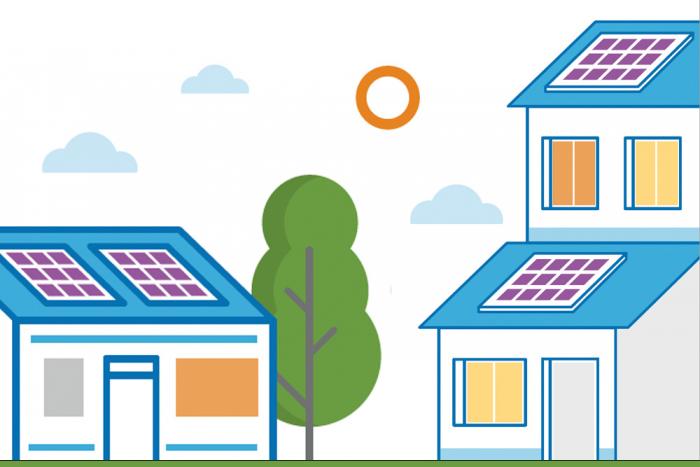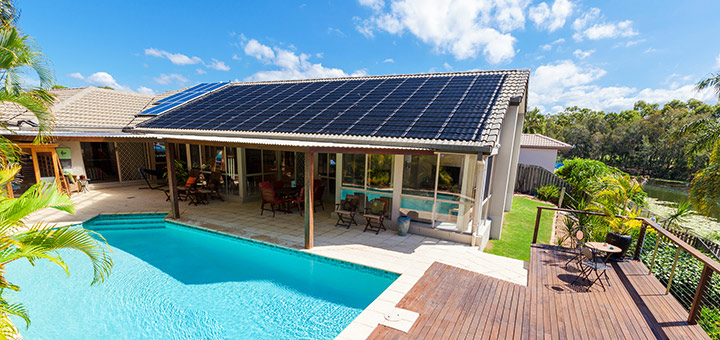Empower Your Home with Solar: Seamless Solar Installation

Empower Your Home with Solar: Seamless Solar Installation
Harnessing the power of the sun through home solar installation has become an increasingly popular choice for environmentally conscious homeowners. Installing solar panels not only contributes to a sustainable future but also offers a range of benefits for homeowners. Let’s delve into the process and advantages of seamless home solar installation.
Understanding the Basics of Solar Installation
Home solar installation involves the placement of photovoltaic (PV) panels on the roof or in an open area on the property. These panels capture sunlight and convert it into electricity through the photovoltaic effect. The generated electricity is then utilized to power the home, reducing reliance on traditional grid-supplied energy.
Site Assessment and Customized Design
The first step in home solar installation is a thorough site assessment. Professionals evaluate factors such as sunlight exposure, roof orientation, and shading to determine the optimal placement of solar panels. Following the assessment, a customized solar design is created, ensuring maximum energy production and efficiency for the specific property.
Professional Installation Process
Once the design is finalized, the actual installation process begins. Experienced solar installers handle the mounting of solar panels, electrical wiring, and connection to the home’s electrical system. Professional installation ensures compliance with local regulations and standards, guaranteeing a safe and efficient solar energy system for the home.
Integration with Home Electrical Systems
Home solar installation seamlessly integrates with the existing electrical systems of the house. The generated solar power can either directly power the home’s electrical needs or be stored in batteries for later use. In cases where the solar system produces excess energy, homeowners may have the option to feed it back into the grid, earning credits or incentives.
Financial Incentives and Cost Savings
One of the significant advantages of home solar installation is the potential for financial incentives and long-term cost savings. Many governments offer tax credits, rebates, and other financial incentives to encourage the adoption of solar energy. Additionally, homeowners can experience substantial savings on their energy bills as they rely more on clean, renewable solar power.
Environmental Benefits of Solar Energy
Choosing home solar installation contributes to a reduction in greenhouse gas emissions and environmental impact. Solar energy is a clean and renewable resource, producing electricity without the pollution associated with traditional energy sources. By opting for solar, homeowners actively participate in mitigating climate change and promoting a greener planet.
Increased Property Value
Homes equipped with solar panels often see an increase in property value. The investment in home solar installation is viewed positively by potential buyers, and the long-term energy savings add to the overall appeal of the property. Solar-equipped homes stand out in the real estate market as sustainable and forward-thinking.
Low Maintenance and Durability
Solar panels are designed to be durable and require minimal maintenance. Regular cleaning and occasional checks by professionals are usually sufficient to ensure optimal performance. With no moving parts, solar panels have a long lifespan, providing a reliable and low-maintenance energy solution for homeowners.
Community and Energy Independence
Home solar installation fosters a sense of community and energy independence. Solar-equipped homes contribute to local energy production, reducing the demand on centralized power grids. This decentralized energy model enhances resilience, especially in times of grid outages or emergencies, providing homeowners with a more reliable source of power.
Embracing a Sustainable Lifestyle
Beyond the practical benefits, home solar installation allows homeowners to embrace a sustainable lifestyle actively. By generating clean energy on-site, individuals contribute to a more sustainable energy future. This conscious choice aligns with a broader commitment to environmental stewardship and reducing one’s carbon footprint.
In conclusion, home solar installation is a transformative step towards a more sustainable and energy-efficient future. From the seamless integration of solar panels to the financial incentives and environmental benefits, homeowners can empower their homes with clean, renewable energy. To explore more about home solar installation, visit Home Solar Installation.
Solar Energy Home: Powering Tomorrow’s Sustainable Living

Harnessing the Future: The Solar Energy Home Revolution
In an era where sustainable living takes center stage, the concept of a Solar Energy Home emerges as a powerful and transformative solution. This article delves into the myriad benefits and innovations that define the Solar Energy Home revolution, shaping a future where households are not just consumers but also contributors to clean and renewable energy.
The Essence of a Solar Energy Home
At the core of the Solar Energy Home is the utilization of solar panels to convert sunlight into electricity. This green technology allows homeowners to harness the power of the sun, reducing reliance on conventional energy sources and contributing to a cleaner environment. The Solar Energy Home is more than just a dwelling; it’s a sustainable powerhouse that aligns residential living with ecological responsibility.
Energy Independence through Solar Power
One of the primary advantages of adopting a Solar Energy Home is the attainment of energy independence. By generating electricity on-site through solar panels, homeowners reduce their dependence on external power grids. This autonomy not only ensures a consistent power supply but also shields households from energy price fluctuations, providing long-term stability.
Financial Benefits and Return on Investment
Investing in solar energy for the home is a savvy financial decision. While the initial setup involves an investment, the long-term savings are substantial. Solar panels have a lifespan of several decades and require minimal maintenance. Homeowners can experience a return on investment through reduced energy bills, potential government incentives, and even the possibility of selling excess energy back to the grid.
Reducing Carbon Footprint and Environmental Impact
The Solar Energy Home plays a pivotal role in the global effort to combat climate change. By relying on clean and renewable energy, households significantly reduce their carbon footprint and environmental impact. This shift away from fossil fuels contributes to lower greenhouse gas emissions, promoting a healthier planet for current and future generations.
Innovations in Solar Technology for Homes
Ongoing innovations in solar technology enhance the efficiency and aesthetics of Solar Energy Homes. Advanced solar panels, energy storage solutions, and smart home integration are transforming the residential solar landscape. These innovations not only maximize energy production but also provide homeowners with greater control and insights into their energy consumption patterns.
Government Incentives and Support
Governments worldwide recognize the importance of promoting solar energy adoption. Various incentives and support programs are in place to encourage homeowners to embrace solar technology. These may include tax credits, rebates, and favorable financing options. Government backing accelerates the transition towards Solar Energy Homes and makes sustainable living more accessible.
Grid-Tied and Off-Grid Solar Solutions
Solar Energy Homes can be grid-tied or off-grid, offering flexibility based on individual preferences and geographical locations. Grid-tied systems allow homeowners to remain connected to the traditional power grid, while excess energy can be fed back into it. Off-grid solutions provide complete energy independence, relying solely on solar panels and energy storage.
Community Impact and Renewable Energy Advocacy
The adoption of Solar Energy Homes extends beyond individual households to create a positive community impact. Homes equipped with solar panels inspire neighbors and communities to explore renewable energy solutions. This collective shift towards solar adoption contributes to a broader advocacy for renewable energy and fosters a sense of environmental responsibility.
Educational Outreach for Solar Literacy
Empowering individuals with solar literacy is a crucial aspect of the Solar Energy Home revolution. Educational outreach programs and initiatives raise awareness about the benefits of solar energy, dispel myths, and provide practical information for homeowners considering solar installations. Solar literacy ensures informed decision-making and widespread adoption of sustainable practices.
Join the Solar Energy Home Movement Today
Ready to be a part of the Solar Energy Home movement? Explore the possibilities and learn more about transforming your home into a sustainable powerhouse by visiting Solar Energy Home. Embrace the future of clean and renewable energy, reduce your carbon footprint, and contribute to a world powered by the sun.
In conclusion, the Solar Energy Home represents more than a technological upgrade; it symbolizes a commitment to sustainable living and environmental stewardship. As solar technology continues to advance, the Solar Energy Home revolutionizes the way we power our homes, shaping a future where every dwelling is a beacon of clean and renewable energy.
Solar Energy Home: Powering Sustainable Living

Powering Sustainable Living with Solar Energy Home
Harnessing the power of the sun to transform your home into a solar-powered haven offers not only environmental benefits but also a pathway to sustainable living. From reduced energy costs to minimizing your carbon footprint, a solar energy home is a step towards a cleaner and greener future.
The Solar Energy Home Advantage
A solar energy home is equipped with photovoltaic (PV) panels that capture sunlight and convert it into electricity. This clean and renewable energy source provides homeowners with a reliable and sustainable power supply. The solar energy home advantage extends beyond the immediate financial benefits to fostering a sense of environmental responsibility.
Financial Savings through Solar Power
One of the most compelling reasons to embrace a solar energy home is the potential for significant financial savings. While the initial investment in solar panels and installation may seem substantial, the long-term return on investment is substantial. Solar panels can generate electricity for decades, leading to reduced dependence on traditional grid power and lower utility bills.
Environmental Impact of Solar Homes
Solar energy homes contribute positively to the environment by reducing reliance on non-renewable energy sources. Generating electricity from the sun produces minimal carbon emissions, making it an eco-friendly alternative. By choosing a solar energy home, individuals actively participate in the global effort to mitigate climate change and decrease the overall carbon footprint.
Energy Independence and Reliability
Solar energy homes enjoy a degree of energy independence. With a solar power system in place, homeowners have a reliable source of electricity, even during power outages. This energy reliability enhances the resilience of a solar energy home, providing uninterrupted power for essential appliances and systems.
Government Incentives and Rebates
Governments around the world encourage the adoption of solar energy through various incentives and rebates. Homeowners transitioning to solar can benefit from tax credits, rebates, and other financial incentives. These initiatives aim to make solar energy more accessible and affordable, supporting the widespread adoption of sustainable energy practices.
Net Metering for Solar Energy Homes
Net metering is a system that allows solar energy homes to receive credit for excess electricity generated. When solar panels produce more electricity than needed, the surplus is fed back into the grid. In return, homeowners receive credits on their utility bills, further maximizing the financial benefits of a solar energy home.
Sustainable Home Value
A solar energy home often experiences an increase in property value. The integration of solar panels is viewed favorably by homebuyers, reflecting a commitment to sustainability and reduced operating costs. Sustainable features contribute to the overall appeal of a home in a real estate market increasingly prioritizing eco-friendly living.
Technological Advancements in Solar Energy
Ongoing technological advancements in solar energy continue to enhance the efficiency and affordability of solar panels. Innovations in solar technology contribute to more accessible options for homeowners, facilitating the widespread adoption of solar energy homes. Staying informed about these advancements allows homeowners to make informed decisions about upgrading or installing solar systems.
Community Impact and Education
Solar energy homes have a positive impact beyond individual households. Communities embracing solar energy contribute to localized clean energy production and environmental conservation. Additionally, the presence of solar energy homes serves as an educational opportunity, inspiring others to explore sustainable living practices and adopt solar solutions.
Making the Transition to a Solar Energy Home
Making the transition to a solar energy home involves several steps, from a thorough solar assessment to installation. Choosing reputable solar providers, understanding the available incentives, and evaluating the energy needs of your home are essential considerations. To explore more about transitioning to a solar energy home, visit Solar Energy Home.
In conclusion, embracing a solar energy home is a transformative step towards sustainable living. From financial savings to environmental impact and community benefits, the advantages of solar energy homes are multifaceted. As technology continues to evolve and governments incentivize sustainable practices, the prospect of a solar-powered future becomes increasingly accessible for homeowners.
